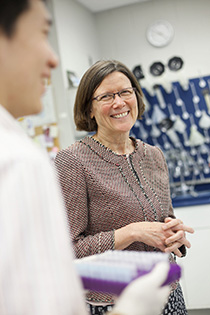END NOTE
Engaged Cornell fosters student-community connections

Vice Provost Judith Appleton leads the new Engaged Cornell initiative. See larger image
When I think about interconnectedness, I think about Rachel Harmon '15, an ILR School student who approaches her Cornell education by always connecting it to the greater good in society. She is a Public Service Center Scholar and a teaching assistant with the Cornell Prison Education Program, which offers courses toward a degree for inmates at the correctional facility in Auburn, New York.
Harmon has spoken about how her academic work feels "more meaningful" when it is part of a direct connection to others outside Cornell. "If it feels like this completely cerebral exercise has no real consequence, then it's harder for me to be motivated as a student," she has said. "But if I know that this is going to help understand issues like educational inequality, mass incarceration or the labor struggle, then I'm in class, I'm reading, I'm engaged because these things matter to me."
The recipient of two undergraduate research fellowships and a Rawlings Presidential Research Scholarship, Harmon's current project focuses on the high levels of incarceration in southern rural communities. She plans to pursue a doctoral degree in sociology and will continue to connect academic inquiry with civic life.
Perspectives like Harmon's – interconnectedness rooted in a Cornell education – exemplify how the new Engaged Cornell initiative will transform the undergraduate experience of so many students.
Generously supported by a gift from the Einhorn Family Charitable Trust, Engaged Cornell aims to promote innovation in community-engaged learning.
When study occurs in a real-life setting or community, students develop strong connections with their teachers, with one another and with members of that community. They learn to talk with people they have not met before and with whom they may not share life experience. They develop empathy. Understanding the experiences and perspectives of others is crucial to "helping people to get along better" – the goal Cheryl and David Einhorn set for their trust.
Engaged Cornell will provide community-engaged learning to many more students by expanding courses and disciplines that engage with the public. This also will give many of our faculty members exciting opportunities to bring community engagement to life within their fields of study.
Communities involved with the initiative will encompass groups that not only share a location, but also a life experience, a need or an opportunity. Courses that reach across disciplines will be encouraged, since interdisciplinary approaches are essential to solve the complex problems that Cornell graduates will face.
In higher education, community-engaged learning is considered to be a high-impact practice – one that can be life-changing – and, therefore, such teaching is highly rewarding. In my experience as a faculty member, it is thrilling to observe a student when "the light goes on."
Our aspiration for Engaged Cornell is to help students connect their personal "light" to real-world problem solving and enable them to meet the challenges they will face where they live and where they work with creativity and effectiveness.
I recently met an alumna who said that in addition to her academic work, at Cornell she had "learned how to think," crediting her fellow students with teaching her and challenging her. This stimulated her intellectual growth in ways she did not anticipate, or perhaps appreciate, at the time.
By encouraging study and learning across differences in background and experience, promoting cooperative learning and reflection, and providing innovative learning opportunities in many disciplines, Engaged Cornell will facilitate the intellectual growth and interconnectedness that is the signature of a Cornell education.
Judith Appleton leads the new Engaged Cornell initiative. She is a vice provost and the Alfred H. Caspary Professor of Immunology in the Baker Institute for Animal Health in the College of Veterinary Medicine. Visit www.cornell.edu/engagement for more information.